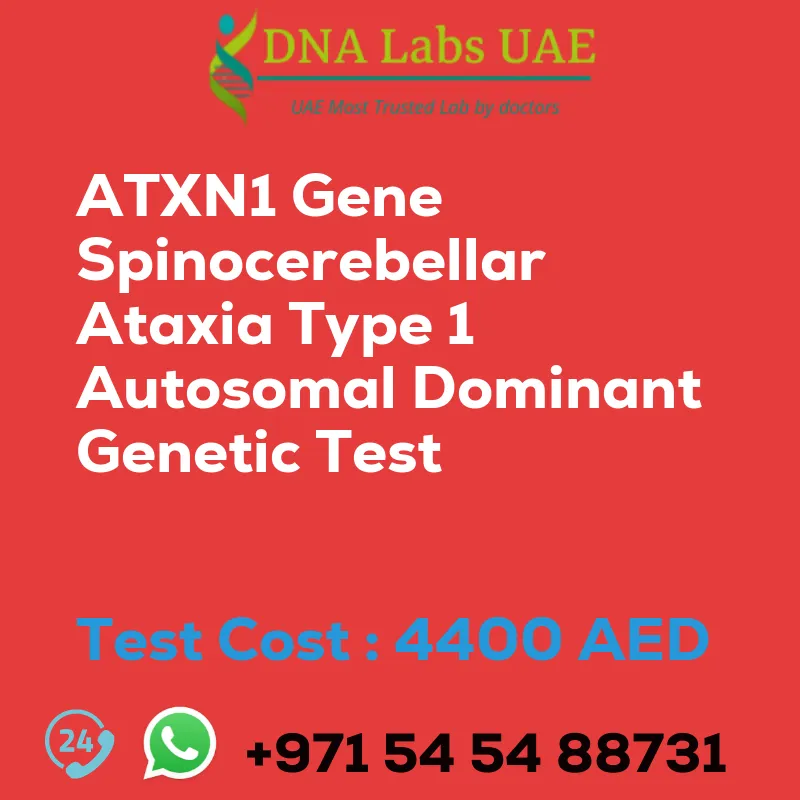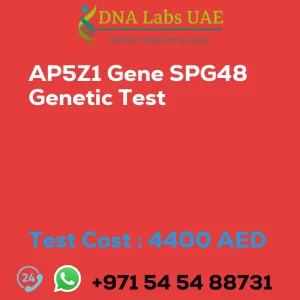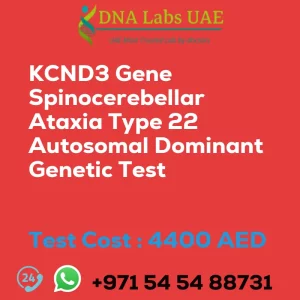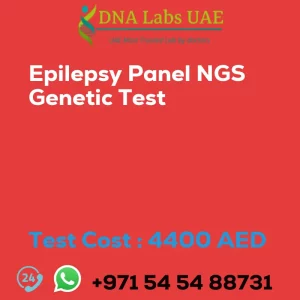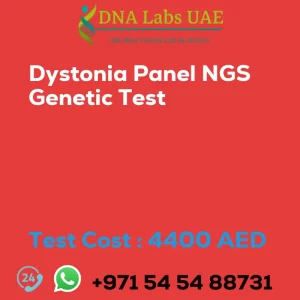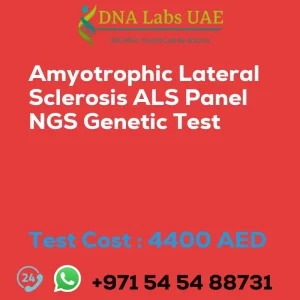ATXN1 Gene Spinocerebellar Ataxia Type 1 Autosomal Dominant Genetic Test
Genetic testing is an important tool in diagnosing and understanding genetic disorders. At DNA Labs UAE, we offer the ATXN1 Gene Spinocerebellar Ataxia Type 1 Autosomal Dominant Genetic Test to help individuals and families affected by this condition.
Test Components and Price
Test Name: ATXN1 Gene Spinocerebellar Ataxia Type 1 Autosomal Dominant Genetic Test
Components: NGS Technology
Price: 4400.0 AED
Sample Condition and Report Delivery
Sample Condition: Blood or Extracted DNA or One drop Blood on FTA Card
Report Delivery: 3 to 4 Weeks
Test Type and Doctor
Test Type: Neurological Disorders
Doctor: Neurologist
Test Department
Test Department: Genetics
Pre Test Information
Clinical History of Patient: A Genetic Counselling session to draw a pedigree chart of family members affected with ATXN1 Gene Spinocerebellar Ataxia Type 1, autosomal dominant
Test Details
The ATXN1 gene is associated with Spinocerebellar Ataxia Type 1 (SCA1), which is an autosomal dominant genetic disorder. SCA1 is characterized by progressive degeneration of the cerebellum, leading to impaired coordination and balance, as well as other neurological symptoms.
NGS (Next-Generation Sequencing) genetic testing is a method used to analyze multiple genes simultaneously, including the ATXN1 gene, to identify any mutations or variations that may be present. This type of testing can help diagnose SCA1 and determine if an individual has inherited the condition.
During the NGS genetic test, a small sample of the individual’s DNA, usually obtained through a blood sample or cheek swab, is analyzed. The DNA is sequenced, and any variations in the ATXN1 gene or other genes associated with ataxias are identified. These variations can then be compared to known disease-causing mutations to determine if the individual has SCA1.
NGS genetic testing for SCA1 can be useful in confirming a diagnosis, as well as in providing information about the inheritance pattern and the likelihood of passing the condition on to future generations. It can also be used for carrier testing in individuals who have a family history of SCA1 but do not show symptoms themselves.
It is important to note that genetic testing for SCA1 should be performed by a qualified healthcare professional or genetic counselor who can provide appropriate counseling and support throughout the testing process.
| Test Name | ATXN1 Gene Spinocerebellar ataxia type 1 autosomal dominant Genetic Test |
|---|---|
| Components | |
| Price | 4400.0 AED |
| Sample Condition | Blood or Extracted DNA or One drop Blood on FTA Card o |
| Report Delivery | 3 to 4 Weeks |
| Method | NGS Technology |
| Test type | Neurological Disorders |
| Doctor | Neurologist |
| Test Department: | Genetics |
| Pre Test Information | Clinical History of Patient who is going for ATXN1 Gene Spinocerebellar ataxia type 1, autosomal dominant NGS Genetic DNA Test A Genetic Counselling session to draw a pedigree chart of family members affected with ATXN1 Gene Spinocerebellar ataxia type 1, autosomal dominant |
| Test Details |
The ATXN1 gene is associated with Spinocerebellar Ataxia Type 1 (SCA1), which is an autosomal dominant genetic disorder. SCA1 is characterized by progressive degeneration of the cerebellum, leading to impaired coordination and balance, as well as other neurological symptoms. NGS (Next-Generation Sequencing) genetic testing is a method used to analyze multiple genes simultaneously, including the ATXN1 gene, to identify any mutations or variations that may be present. This type of testing can help diagnose SCA1 and determine if an individual has inherited the condition. During the NGS genetic test, a small sample of the individual’s DNA, usually obtained through a blood sample or cheek swab, is analyzed. The DNA is sequenced, and any variations in the ATXN1 gene or other genes associated with ataxias are identified. These variations can then be compared to known disease-causing mutations to determine if the individual has SCA1. NGS genetic testing for SCA1 can be useful in confirming a diagnosis, as well as in providing information about the inheritance pattern and the likelihood of passing the condition on to future generations. It can also be used for carrier testing in individuals who have a family history of SCA1 but do not show symptoms themselves. It is important to note that genetic testing for SCA1 should be performed by a qualified healthcare professional or genetic counselor who can provide appropriate counseling and support throughout the testing process. |

